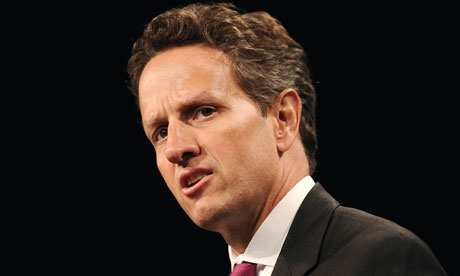Tim Geithner: a legacy of financial failure containment
http://www.guardian.co.uk/commentisfree/2013/jan/30/tim-geithner-legacy-financial-failure-containment

Outgoing US treasury secretary Tim Geithner aimed to 'find better ways of managing the inevitable failures that will happen in competitive markets'. Photograph: Carl De Souza/AFP/Getty Images
As Tim Geithner departs from the US Treasury, it is instructive to reflect on the legacy of a long career which has been unusual for the US, resembling more that of the most successful and powerful permanent civil servants in other G7 countries.
Geithner (whose father was a Ford Foundation executive in Asia) was only in his 20s when he joined the Treasury in 1988 and dispatched to Tokyo as the assistant Treasury attaché in the US embassy. He rose rapidly through the international division of the Treasury under Robert Rubin and Larry Summers, becoming under-secretary of international affairs in 1998. With the change in administrations he moved his office a few blocks from 1500 Pennsylvania Avenue to the IMF headquarters, where he served as director of the policy development and review department. In 2003 he was appointed president of the New York Federal Reserve – the pivotal operational position in what has been called "the Treasury-Fed-Wall Street nexus".
This passage to the pinnacle of power in these key institutions of the American state only compares with Paul Volcker's illustrious career, moving back and forth as he did between the Fed and the Treasury between the 1950s and the 1980s. Indeed, it might be said that Geithner's key international role at the Treasury in the 1990s was built on the foundation established when Volcker was there in the 1960s, bringing together senior officials from the leading capitalist states to discuss the implications of their governments' policies for international financial markets in suitably "intimate settings", as Volcker described them. Volcker continuted:
"These people were not politicians; they mainly had long careers in government. They all had an unusual sense of commitment and common purpose, and they built up a reserve of mutual trust that paid off later in an ability to reach quick decisions."
